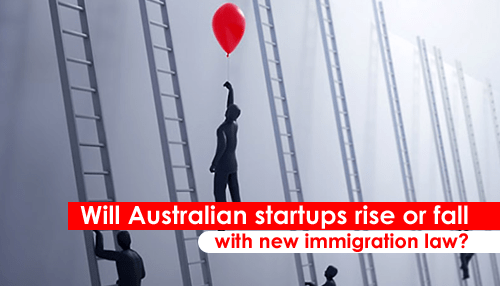Up until a few months ago, the Australian startups scene in the Land Down Under was a Garden of Eden for immigrants on the lookout for decently paid jobs. Alas, matters in the business arena can – and usually do – change in a day, or at least within months, as was the case with Australia.
Back in April, Australian Prime Minister Malcolm Turnbull announced the government would scrap Visa 457, an employer-sponsored visa program for skilled immigrants, and swap it for two temporary skills shortage (TSS) visa programs.
The news spread like wildfire, raising many an eyebrow in the Australian startup crowd, and questions began to multiply as to what would happen to up-and-coming businesses.
Once bright minds from overseas were no longer able to get a permanent residency in the Land Down Under by legal means. Although it’s yet to be seen what future may befall Australian startups after the new visa programs enter into force, it’s already clear matters will never be the same for either job-hungry foreigners or young brands Down Under.
Off to Australia to seek their fortune: Then and now
The Australian government had dwelt on Visa 457 for a while before it finally decided to scrap it claiming lax entry regulations were to blame skilled Australians couldn’t get jobs in their field of expertise.
To prevent migrants from running off with well-paid jobs local workforce may fill, the Australian authorities moved to replace the four-year program with two different visa programs that will last two and four years, respectively.
The biggest changes the new programs will bring are reflected in the range of positions available to skilled migrants and the standards foreign job candidates will be required to meet.
With new short- and mid-term visa programs in place, the list of positions foreigners will be able to apply for will be trimmed from 651 to 453, but only candidates with a superb command of English, two-year work experience, and a clean police record can hope to receive interview summons.
On top of that, a foreign job hopeful will have to pass mandatory labor market testing to make sure an Australian startups worker wouldn’t be able to fill the position.
A different Australian startups landscape: The pointy end of the visa
When the government abolishes Visa 457 in March 2018, local Australian startups in dire need of staff with specific sets of skills will begin to face hardships finding workers who fit their bill.
Migrants and Australian startups in creative niches such as entertainment (actors, singers, composers, writers, etc.) will be most affected by the visa change, as well as foreigners on the lookout for vacancies in HR, PR, media, medical industry, and catering.
Jockeys, police officers, antique dealers, golfers, divers, translators, zookeepers, and pilots are also some of the professions that will from now on be available to Australians only.
Still, the visa reshuffle may be favorable for Australian nationals looking to jump on board startups in many industries. Experts are warning the change might have negative effects on the options. In the future, workers to learn from foreign professionals who have critical knowledge and experience in key startup industries such as IT or marketing.
Furthermore, the new visa program will make it more difficult for startup founders and employees to move to the Land Down Under regardless of their visa eligibility, and it might also prove to be counterproductive in areas short of a local workforce that fits professional needs.
Que sera, sera: Terms of job engagement for migrants
Despite the visa program change, migrants looking to land jobs in startups across Australia will still be able to get their foot in the door and call it a good bargain.
Immigrants aged under 30 will have the easiest access to jobs Down Under through the working holiday visa program, which allows the youth of all qualifications and skills to spend a year traveling and working throughout Australia.
According to certain announcements, the working holiday visa program might even be extended to two years for individuals who agree to work for three months in rural regions.
On top of that, there are rumors that skilled workers from overseas may still be able to apply for other visa programs, such as the Skilled Independent Visa (subclass 189) or Regional Sponsored Migration Scheme (subclass 187) depending on qualifications, experience, and target residence.
If you’re looking for a job in Sydney but aren’t sure if your location is on the local skills shortage list or would like to learn more about the legal aspect of the move, it would be a smart idea to contact an experienced immigration lawyer in Parramatta or another Sydney suburb and check if you qualify for a two or four-year TSS visa.
Will the new visa program make or break the Australian startups scene? Right now, everything’s still in the air, but one thing is certain:
With the Australian-first hiring policy, Australian startups Down Under will be in for a heavy blow as they will no longer be able to get their hands on handpicked professionals from overseas as easily as they once could.
On the plus side, the visa program change will force Australian workers to brush up their skills and qualifications if they’re to rise to the professional challenge. Let’s just hope Aussies have what it takes to beat foreign experts on home terrain.
About Author
 My name is Alex Williams. I am a journalism graduate and a rookie blogger trying to find my luck. Blogs are the perfect opportunity for presenting yourself to a wider audience, getting the chance to showcase my expertise, and receiving recognition. I am a regular contributor at Bizzmark Blog | Facebook | Twitter
My name is Alex Williams. I am a journalism graduate and a rookie blogger trying to find my luck. Blogs are the perfect opportunity for presenting yourself to a wider audience, getting the chance to showcase my expertise, and receiving recognition. I am a regular contributor at Bizzmark Blog | Facebook | Twitter


